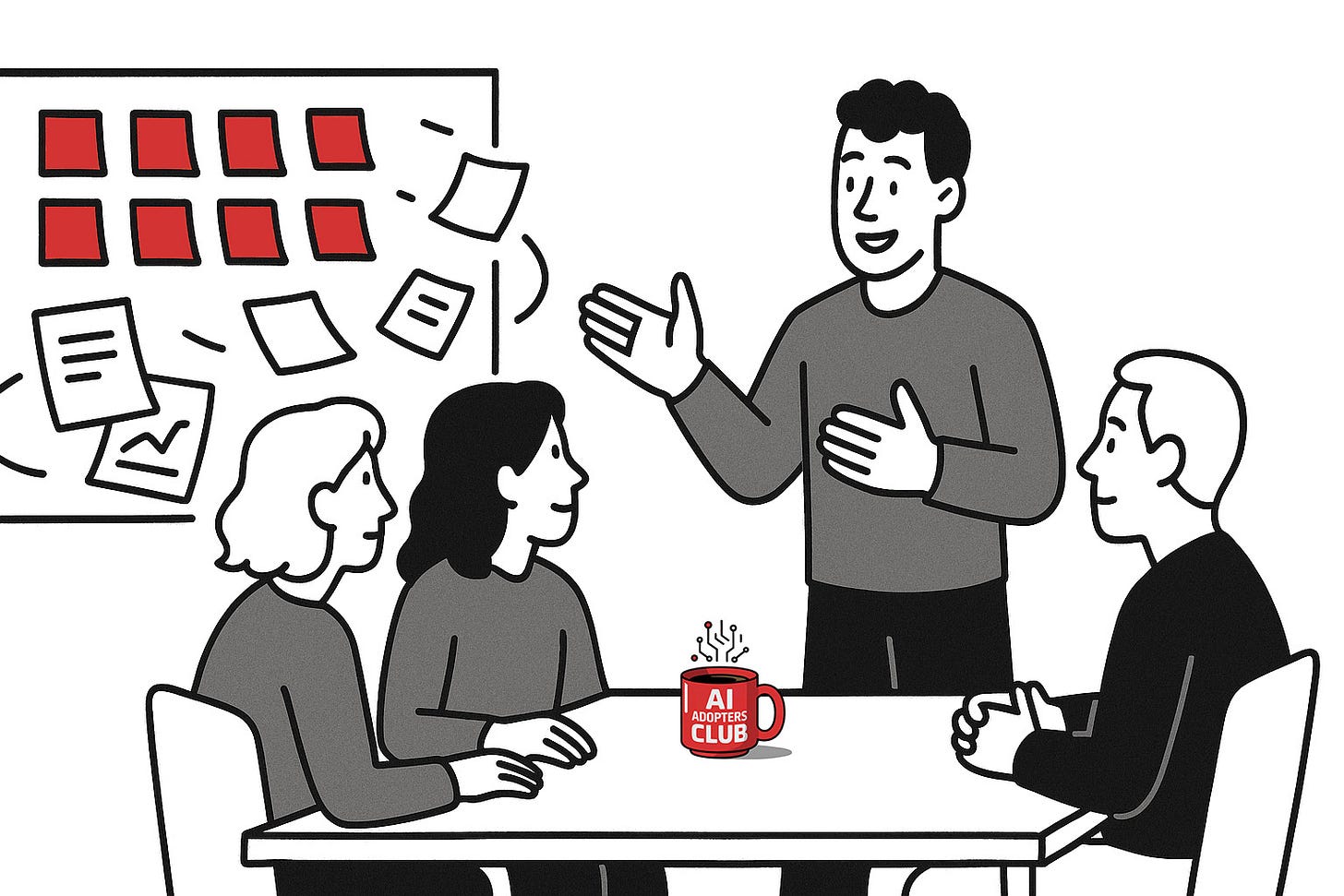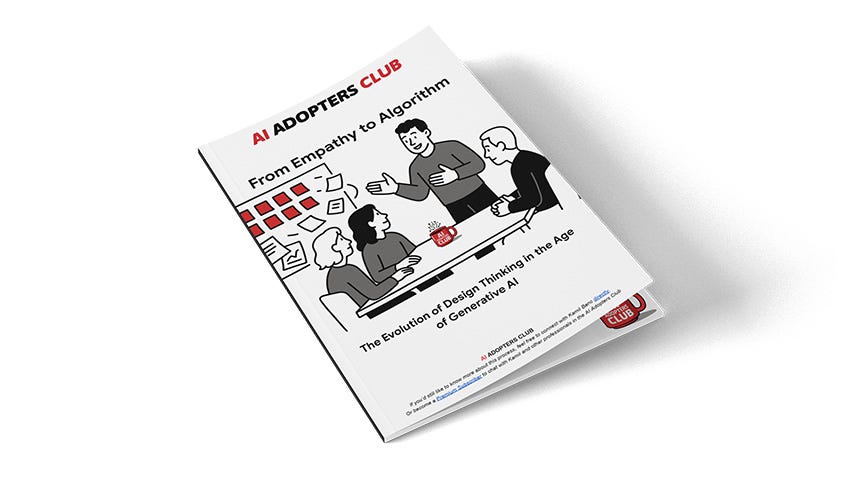How Design Thinking Coaches Use AI To Turn Chaotic Brainstorming Into Breakthrough Solutions
Stop managing workshops. Start facilitating breakthroughs.
Hey Adopter,
Most design thinking coaches spend their workshops managing logistics instead of catalyzing insights. They're stuck organizing sticky notes, keeping time, and herding participants through activities while the real magic, the moment when breakthrough thinking happens, gets squeezed into whatever time remains.
I've watched dozens of workshops where brilliant facilitators burn 60% of their mental energy on process management. Meanwhile, participants drift between shallow brainstorming and generic solutions because nobody's really listening for patterns or pushing the thinking deeper.
Your AI assistant changes this completely.
The facilitation bottleneck nobody talks about
Traditional design thinking workshops have a fundamental problem. The facilitator becomes a single point of failure, trying to simultaneously guide participants, capture insights, spot emerging themes, and maintain energy levels.
Think about everything you do as a facilitator or a trainer. You create and market training courses, you prepare workshops, you facilitate experiences, you document outcomes, and so on. For each of those steps, there are hundreds of possible use-cases AI can help you with.
Most coaches compensate by over-structuring their sessions. Rigid agendas. Predictable exercises. Safe outcomes that participants forget within a week.
The result? Workshops that feel more like corporate theater than creative breakthroughs.
Your AI partner advantage
AI for Facilitators takes a hands-on approach to integrating AI into facilitation and workshop design. Participants will learn how to leverage AI to structure workshops, enhance collaboration, and streamline facilitation tasks.
Smart facilitators treat AI as their real-time co-facilitator. Not a replacement for human connection, but a thinking partner that handles the cognitive overhead while you focus on what humans do best: reading the room, building trust, and pushing thinking beyond obvious solutions.
Your AI partner excels at tasks that drain facilitator energy: synthesizing scattered ideas into coherent themes, identifying gaps in thinking, suggesting alternative perspectives when groups get stuck, and maintaining momentum during challenging conversations.
With AI's potential to increase the quality of collaborative outputs, teams should incorporate it into their workshops to maximize success. That starts with thoughtful preparation — but once the workshop begins, facilitators need to guide participants in using AI effectively, creatively, and collaboratively.
Download the Full Report
Get the complete 20-page analysis on how AI is revolutionizing every stage of design thinking, from empathy research to prototype testing, with real case studies from Netflix, General Motors, and Adobe.
Two prompts that transform your workshops
Here are two specific prompts I use to turn AI into an active facilitation partner during live sessions.
Prompt 1: The real-time synthesis partner
You are my co-facilitator for this design thinking workshop. I will share participant responses and insights as they emerge throughout our session. Your role is to:
1. Identify recurring themes and patterns across different participant inputs
2. Spot gaps or blind spots in the group's thinking
3. Suggest probing questions when discussion gets shallow
4. Flag when we're ready to move to the next phase
Current workshop context: [Brief description of the challenge and participants]
Phase we're in: [Empathize/Define/Ideate/Prototype/Test]
As I share participant insights, respond with:
- Key patterns you're noticing
- One thoughtful question to deepen the discussion
- Signal if we should transition to the next activity
Ready to start. Here's what participants are saying about [current topic]...
Use this throughout your workshop by copying participant responses into your AI chat. Your AI partner will spot connections you miss and suggest questions that unlock deeper insights.
Prompt 2: The breakthrough catalyst
We're stuck. Our design thinking group has been brainstorming for 20 minutes and we keep circling back to the same predictable solutions.
Here's our challenge: [Describe the specific problem they're working on]
Here are the ideas they've generated so far: [List current ideas]
I need you to be the devil's advocate and breakthrough catalyst. Please:
1. Challenge one key assumption underlying their current ideas
2. Suggest 3 completely different angles they haven't considered
3. Pose one provocative question that could shift their entire approach
4. Recommend a specific exercise or constraint that might unlock fresh thinking
Help me get this group past surface-level solutions to something that could actually make a difference.
Deploy this when energy drops or thinking gets predictable. Your AI partner will surface the uncomfortable questions and alternative perspectives that human facilitators often hesitate to raise.
The strategic shift this enables
During the actual delivery of workshops, AI can play a crucial role in enhancing facilitation techniques. For example, natural language processing (NLP) algorithms can analyse participant responses in real-time, providing facilitators with valuable insights into individual understanding and engagement levels.
When AI handles synthesis and pattern recognition, you're free to focus on the human elements that create breakthrough moments: building psychological safety, challenging assumptions, and helping participants see possibilities they couldn't imagine alone.
This isn't about replacing the facilitator. It's about amplifying what great facilitators already do by removing the cognitive burden of managing information while they're trying to guide transformation.
The best coaches already understand this. They're using AI to become more present, more insightful, and more effective at creating the conditions where real innovation happens.
Your workshop participants won't know you're getting AI support. They'll just notice that you seem to hear everything, connect ideas they missed, and ask questions that unlock insights they didn't know they had.
Stop managing workshops. Start facilitating breakthroughs.
Adapt & Create,
Kamil




